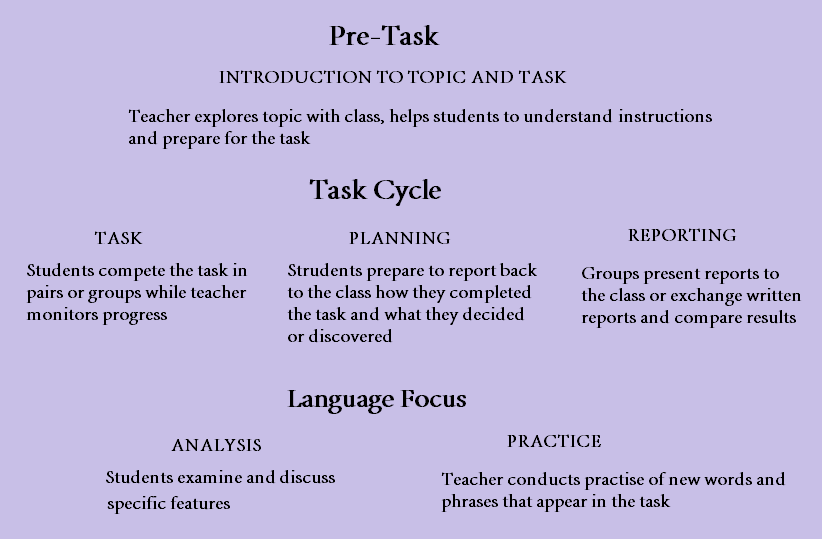 Task-based Learning (TBL)
Task-based Learning (TBL)
Task-based learning (TBL) is a teaching method that focuses on context and meaning. This approach is also called task-based instruction (TBI) or task-based language teaching (TBLT).
In a task-based language learning class, teachers give students tasks to compete so that they can practise the language in a personalised and meaningful way.
After completing the task, the teacher asks students to consider the language they used. However, the main focus of a task-based learning class is on the students actually doing the task itself. This reveals the language that is studied.
Task-based language learning uses practical tasks to help students find their own useful vocabulary and language structures.
Example tasks might be going food shopping, visiting the doctor, dealing with issues in an airport, making a telephone call, being interviewed or conducting an interview, ordering a taxi, complaining about a meal in a restaurant or resolving an issue in a shop. Task-based learning allows students to uncover their own vocabulary during the task.
Task-based learning vs PPP technique
There is much discussion over the best way to teach a language lesson. The PPP method of teaching is often used in the classroom as a way of introducing vocabulary or ideas.
The focus in PPP classes is on presentation, practice and production. However some people think that the PPP technique is old fashioned. Some teachers offer task-based learning as a viable alternative to PPP as a more practical teaching method.
A problem with PPP is that students can sometimes end up using unnatural ways to practice new language structures. Task-based learning is supposed to overcome that problem by putting all the emphasis on useful and meaningful tasks as the way to actually learn the language and vocabulary.
Students’ role in task-based language learning
In a task-based language lesson, the teacher doesn’t decide beforehand what language will be taught and learned.
The teacher prepares a task for the students to complete and the language and vocabulary learned is decided upon and produced naturally during the task. This way, the vocabulary learned will be student-led vocabulary that is always meaningful and useful.
A task-based learning or TBL lesson allows the students to take a more central role in determining the language structures they learn. The completion of the main task requires students to think for themselves about what they need to learn and the learning process happens during the completion of the task.
Although teachers do not pre-prepare the vocabulary as much as with a PPP lesson, a task-based language learning lesson does follow a pattern:
Task-based Language Learning (TBL) Lesson Structure
Pre-task preparation
Before the task begins, the teacher needs to present the topic and give instructions on the task. The teacher can also introduce some vocabulary that will be useful to students while they complete the task.
The preparation stage for a task-based language learning lesson might involve giving an example of the task being performed or even showing a video to students so they know what is expected of them.
The emphasis here should be on clarity of explanation, so student know exactly what to do during the task-based learning activity.
The Task
When students come to complete the task in a task-based learning (TBL) lesson, they can work individually, in pairs or in groups.
Normally it is best for students to work in small groups or pairs so they can use the language and practise together verbally and collaboratively.
The teacher should monitor the students’ progress and offer encouragement or help where needed.
Planning and Reporting
The planning and reporting stage of a task-based learning lesson allows students to report back to the group, telling everyone else how they competed the task.
This can be the preparation of a verbal report or a written report. It can be formal in style or more informal in style and they can practice beforehand what they will say or write in their pairs.
This stage of the TBL lesson allows the students and the rest of the class to see what language each group needed and lets them practice their language in a natural way.
The teacher can also show videos of other groups performing a similar task to see how they competed it.
Analysis
During the analysis stage of the task-based learning class, the teacher can take elements from each of the students’ reports and highlight the important language and any overlaps or interesting parts.
Students can discuss specific features of the task, how they approached them and what language skills were needed. If any video was shown during the reporting stage it is also a good idea to discuss how the students in the video completed their task.
Practice
Based on the reports and the analysis stage of the TBL lesson, the teacher can select important areas of the language that need extended practice.
The task and reports will show the areas where students had the most problems and therefore which language areas, words and phrases need practice.
Students can then do some activities to improve their knowledge and confidence with these problematic language areas.
Advantages of Task-Based Learning
A task-based language lesson is much more student-led than many other types of language lesson. In a task-based learning class, the students are more in control of what they learn. In all the stages of the class, the students can use their language skills in a meaningful way.
In many ways this makes a TBL lesson more natural that a PPP lesson, as the language is personalised and connected specifically to the context of the task.
The language explored and learned in a TBL class comes from the needs of the students. The needs uncovered during the task dictate what is learned, instead of this being decided beforehand by the teacher or a textbook.
Task-based learning is a strongly communicative approach to language teaching. In contrast, a PPP lesson is more teacher-driven.
Students need to communicate with each other in order to compete a task so they are forced to find new ways of using language and it quickly becomes clear what areas they find difficult and what areas of knowledge they are lacking in.
The tasks themselves make the TBL lesson motivating as students are engaged straight away and the language feels relevant.
Instead of restricting language lessons to focusing on a single piece of vocabulary or a single grammar point as is often the case in a PPP lesson, task-based language learning lessons let student uncover these areas naturally within a stimulating context.
Disadvantages of Task-Based Learning
Task-based learning has very little focus on accuracy. Because of this, students may find themselves practicing erroneous language a lot of the time.
The language required to complete a task and discuss it may be far above the level of many of the students. This could make the TBL class de-motivating for some students, particularly those of a lower ability level.
The way the groups complete the tasks is their choice. For this reason it is hard for the teacher to know exactly what language areas to introduce before the task.
Presenting certain vocabulary or language structures beforehand might be unnecessary if students do not require that language during the task. However, students could also feel frustrated if they find they do not already have the knowledge of the language points required during the task.
Although in theory, learning via a task can be more stimulating than an ordinary teacher-driven lesson, the motivation of the students depends on the task. The personalisation of the task-based learning (TBL) class can be negated by the task if it does not appeal to the individual student.
Indeed, if students use language they already know to compete the task during the TBL lesson, they are not actually learning anything new – they are only practicing.
Another problem in language learning via a TBL lesson is that task-based learning suits proactive students and confident collaborators. For students who are quiet, shy or simply more reflective in their approach to learning, this might not be the best way for them to learn or even practice a language.
Share your thoughts on task-based learning
Do you like the task-based language learning approach?
Is task-based learning more effective than PPP for language lessons?
Can you think of any more advantages of task-based learning?
How would you address the disadvantages of the TBL approach?


